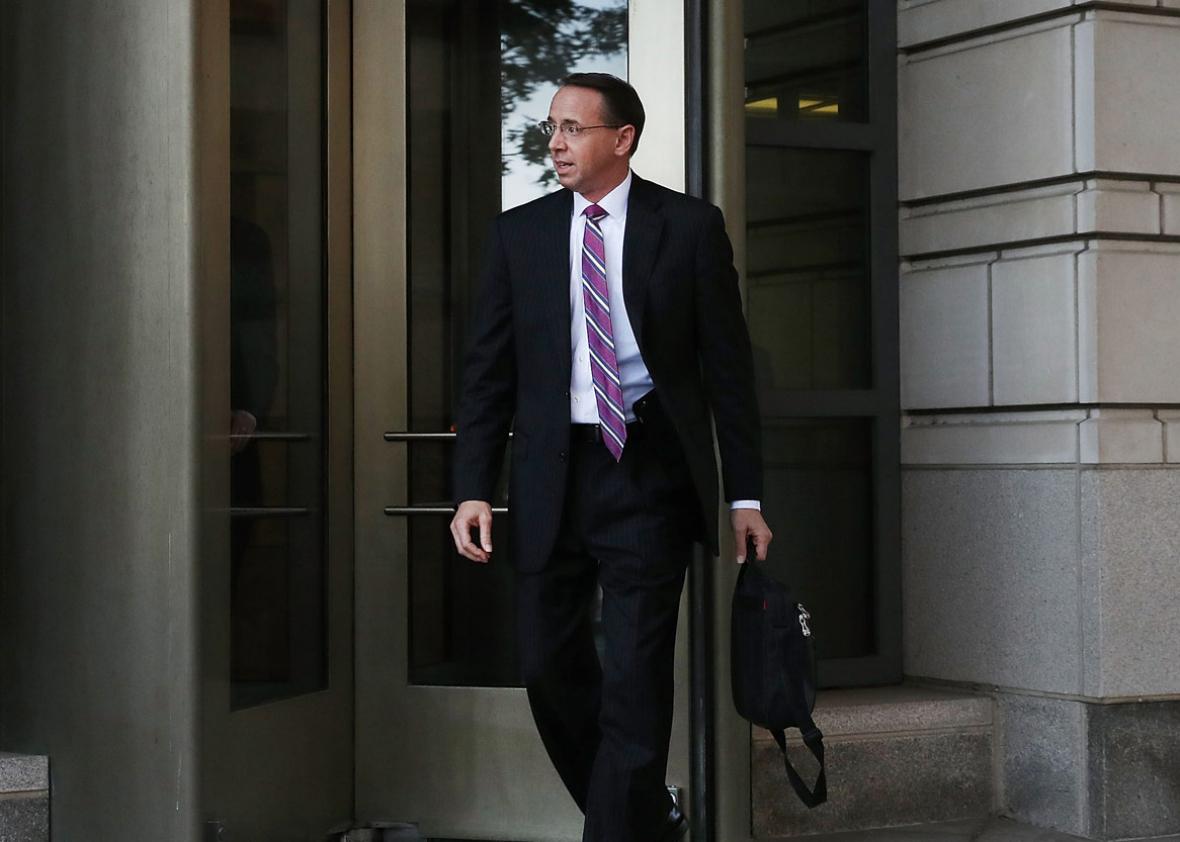On Tuesday, the nominee to be Attorney General Jeff Sessions’ second in command will go before the Senate Judiciary Committee for his confirmation hearing. Rod Rosenstein, nominated to be deputy attorney general, or DAG, is facing perhaps the highest stakes line of questioning in DAG confirmation history.
In a typical situation, the DAG’s primary role is to oversee the day-to-day operations of the Justice Department. But Rosenstein, who has served as Maryland’s U.S. attorney since 2005, would not be not entering a typical situation. As deputy attorney general, Rosenstein will have enormous power. Now that Sessions has recused himself from any investigations pertaining to the 2016 presidential campaign, Rosenstein would be responsible not only for determining how Russia’s interference with our election will be investigated and prosecuted; he may also determine whether the results of that investigation ever come to light. That’s why the questions the committee members ask at Tuesday’s hearing—and the answers Rosenstein gives—may go a long way to determining whether we ever get to the bottom of Russia’s role in the election.
So how can the senators suss out how Rosenstein will wield this power and administer these responsibilities? Senators design questions to serve many interests—sound bites high among them. In this case, however, the committee should prioritize getting Rosenstein on the record on four critical matters while he is under oath. Until that’s done, there is little point in asking much else.
First, the senators need to find out whether Rosenstein will advise his boss to commit to a meaningful recusal. Currently, Sessions’ recusal is narrow—only applying to investigations “arising from campaigns for President.” That means investigations into other potential Russia-related crimes by President Trump, his administration, his associates, and family members are still under Sessions’ purview. Given Sessions’ role in the Trump campaign, his relationship with the president, and his troubling answer to Sen. Al Franken’s question at the confirmation hearing, Rosenstein must commit to recommending to the attorney general that he broaden his recusal to include all potential illicit activities between President Trump, his administration, his associates, and his family members—anyone tied to him and possible illicit activities with Russia. And if Sessions refuses to do so, Rosenstein must commit to reporting that to the senators immediately so the committee can exercise its oversight functions properly.
Second, Rosenstein must pledge to appoint a special counsel to investigate Russia’s influence on the 2016 election and pledge that the counsel will have broad enough jurisdiction. If the jurisdiction does not match with the expanded Sessions recusal discussed above, there most likely will be holes big enough for a Russian tank to drive through.
Third, we have already seen what this White House will do when a DOJ official makes a decision it doesn’t like. Just ask Sally Yates. Rosenstein must commit to ensuring no undue influence is brought to bear on the special counsel. And he must further commit to notifying the Judiciary Committee immediately should anyone attempt to exert such influence.
Finally, if Rosenstein appoints a special counsel, he will have the unilateral authority to decide whether the special counsel issues any public report after the investigation is complete. In this case, there may well be facts that do not give rise to criminal prosecution but are essential for the American people to know. For example, lies (not under oath), coordination with Russia, or financial ties to Putin would not necessarily be criminal but are certainly in the public interest.
In an ideal world, we would have an independent bipartisan commission with subpoena power investigating Russia’s role in the election and Trump’s connection to it, but the bills required to create such a commission cannot even get a hearing in this Congress, much less a vote. So, for now, if we want a truly independent investigation, it will only come from this special counsel. And if there is to be any public report, it will only be issued with Rosenstein’s blessing. The senators, then, must ask Rosenstein to commit to allowing the special counsel to release his or her findings that are in the public interest.
Historically, well-prepared nominees offer lengthy, equivocating answers to such lines of questioning, deploying comforting tone and tenor but ultimately saying nothing. That’s why the Judiciary Committee needs to treat Rosenstein’s hearing more like a deposition. It should frame all queries as direct questions, easily answered with a yes or a no. It should forgo any grandstanding in order to get Rosenstein on the record. And if Rosenstein does not definitively answer yes to all the commitments detailed above, he should not be confirmed.
